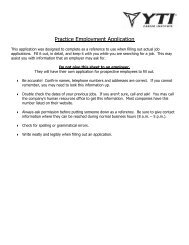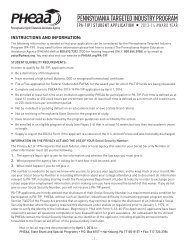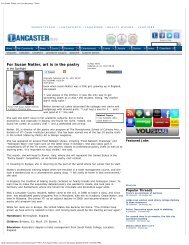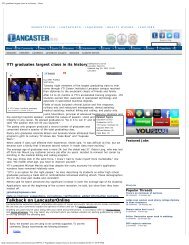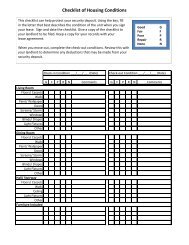Questions to expect during an interview - YTI Career Institute
Questions to expect during an interview - YTI Career Institute
Questions to expect during an interview - YTI Career Institute
Create successful ePaper yourself
Turn your PDF publications into a flip-book with our unique Google optimized e-Paper software.
Personal <strong>Career</strong> Marketing M<strong>an</strong>ualappropriate <strong>to</strong> your strengths <strong>an</strong>d be able <strong>to</strong> identify majorcontributions you might make. In other words, questionsclarify what the <strong>interview</strong>er has in mind while building his orher respect for you.Warning: Your questions should not reveal ignor<strong>an</strong>ce offundamentals or illustrate <strong>to</strong>o great a concern for your ownself-interest.The kinds of questions you ask in <strong>an</strong> <strong>interview</strong> fall primarilyin<strong>to</strong> one of three areas: industry background, comp<strong>an</strong>ybackground, <strong>an</strong>d corporate culture.Area 1: Industry BackgroundYou should make yourself fully prepared by reading industrytrade publications, association journals, press releases, generalbusiness articles, <strong>an</strong>d news releases over the time period ofyour active job search.Area 2: Comp<strong>an</strong>y BackgroundBe aware of comp<strong>an</strong>y products, markets, <strong>an</strong>nual sales,forecasts, achievements, charitable affiliations, communityinvolvement, staffing requirements, <strong>an</strong>d turnover. Currentproblems, mergers, <strong>an</strong>d acquisitions are also import<strong>an</strong>t.Area 3: Corporate CultureYou should prepare as much as possible on the subject ofcorporate culture: What makes this comp<strong>an</strong>y progressive?What is the comp<strong>an</strong>y’s stated mission? What does it take for<strong>an</strong> individual <strong>to</strong> succeed? What is the style <strong>an</strong>d/or m<strong>an</strong>agementphilosophy? What are the values of the comp<strong>an</strong>y?The upcoming paragraphs detail issues you may w<strong>an</strong>t <strong>to</strong>consider asking a prospective employer. The <strong>an</strong>swers <strong>to</strong> thesewill have a major impact on whether you will be happy inyour new position, be well-paid, be in the right environment,<strong>an</strong>d/or be working with people who will respect your values,interests, <strong>an</strong>d contributions.Your questions should be designed <strong>to</strong> get the type ofinformation which will help you decide whether or not youw<strong>an</strong>t <strong>to</strong> pursue a possible job offer with that firm.It is certain even the most well-prepared <strong>an</strong>d conscientious<strong>interview</strong>er will not be able <strong>to</strong> provide complete <strong>an</strong>swers <strong>to</strong>all of these questions. However, it is equally certain the moreinformation you know about those issues directly affectingyour ability <strong>to</strong> perform in your new position, the betteroff you will be. While it is not advised <strong>to</strong> ask a battery ofquestions <strong>during</strong> <strong>an</strong> <strong>interview</strong>, it is desirable for you <strong>to</strong> workyour most pressing questions—the ones whose <strong>an</strong>swers willbe most critical or me<strong>an</strong>ingful <strong>to</strong> you <strong>an</strong>d your employmentdecision—in<strong>to</strong> the <strong>interview</strong> taking place.It is YOUR responsibility <strong>to</strong> ask questions. The <strong>interview</strong>erdoesn’t know if you have <strong>an</strong>y questions <strong>an</strong>d doesn’t knowwhich issues are import<strong>an</strong>t <strong>to</strong> you. When possible, workyour questions in<strong>to</strong> the fabric of the discussion.To summarize: Ask questions. Listen <strong>to</strong> <strong>an</strong>swers. Speakclearly <strong>an</strong>d directly <strong>an</strong>d <strong>to</strong> the point. These are fac<strong>to</strong>rs thatmake job c<strong>an</strong>didates successful in <strong>an</strong> <strong>interview</strong> <strong>an</strong>d lets youknow IF you w<strong>an</strong>t <strong>to</strong> work for a particular comp<strong>an</strong>y.Asking the right questions serves severalpurposes:1.2.3.Demonstrates you’ve done your homework <strong>an</strong>d are preparedfor the <strong>interview</strong>. This, in turn, confirms interest inthe position <strong>an</strong>d desire <strong>to</strong> work for the comp<strong>an</strong>y.Allows you <strong>to</strong> get a feel of the comp<strong>an</strong>y culture <strong>an</strong>d helpsin determining if this will be a good fit for both.Gives you <strong>an</strong> opportunity <strong>to</strong> underst<strong>an</strong>d behind thescene issues.FYI: By getting information about what the comp<strong>an</strong>yneeds, the <strong>expect</strong>ations <strong>an</strong>d the requirements, youposition yourself for a proper follow-up.Be remembered for the quality of your questions. Keep twoor three questions until the end <strong>an</strong>d the <strong>interview</strong>er asks ifyou have <strong>an</strong>y questions. Your <strong>an</strong>swer is a deliberate question:“When is the next <strong>interview</strong>?” <strong>an</strong>d then, perhaps, “How m<strong>an</strong>ypeople are you <strong>interview</strong>ing for this position?”Repeat worthy: Be remembered for your <strong>an</strong>swers <strong>an</strong>dyour questions.“I don’t think that there is <strong>an</strong>y other quality so essential<strong>to</strong> success of <strong>an</strong>y kind as the quality of persever<strong>an</strong>ce. I<strong>to</strong>vercomes almost everything, even nature.”- John D. RockefellerThe following sample questions are phrased so they c<strong>an</strong> beused in connection with a variety of org<strong>an</strong>izations. Rephrasethem by adding specific information uncovered through yourresearch or in a way that is relev<strong>an</strong>t <strong>to</strong> <strong>an</strong> org<strong>an</strong>ization’sspecific needs.Section 8: The InterviewPage 185



